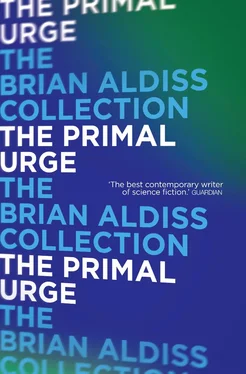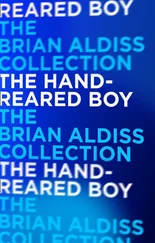Brian Aldiss - The Primal Urge
Здесь есть возможность читать онлайн «Brian Aldiss - The Primal Urge» — ознакомительный отрывок электронной книги совершенно бесплатно, а после прочтения отрывка купить полную версию. В некоторых случаях можно слушать аудио, скачать через торрент в формате fb2 и присутствует краткое содержание. Жанр: unrecognised, на английском языке. Описание произведения, (предисловие) а так же отзывы посетителей доступны на портале библиотеки ЛибКат.
- Название:The Primal Urge
- Автор:
- Жанр:
- Год:неизвестен
- ISBN:нет данных
- Рейтинг книги:5 / 5. Голосов: 1
-
Избранное:Добавить в избранное
- Отзывы:
-
Ваша оценка:
- 100
- 1
- 2
- 3
- 4
- 5
The Primal Urge: краткое содержание, описание и аннотация
Предлагаем к чтению аннотацию, описание, краткое содержание или предисловие (зависит от того, что написал сам автор книги «The Primal Urge»). Если вы не нашли необходимую информацию о книге — напишите в комментариях, мы постараемся отыскать её.
The Primal Urge — читать онлайн ознакомительный отрывок
Ниже представлен текст книги, разбитый по страницам. Система сохранения места последней прочитанной страницы, позволяет с удобством читать онлайн бесплатно книгу «The Primal Urge», без необходимости каждый раз заново искать на чём Вы остановились. Поставьте закладку, и сможете в любой момент перейти на страницу, на которой закончили чтение.
Интервал:
Закладка:
Even such a dream I dream, and know full well
My walking passeth like a midnight spell.
But know not if my dreaming breaketh through
Into the deeps of heaven and hell.
I know but this of all I would I knew:
Truth is a dream, unless my dream is true.
B.W.A.
Introduction
This light-hearted novel has a juicy futuristic edge: someone has invented an electronic device that indicates if the person you are looking at – or talking to – is sexually attracted to you. If attraction is detected, an ER (Emotional Register) – like a coin on one’s forehead – flares with a pinkish glow.
And then? Well, the next move is up to you …
Real figures from the twentieth century feature heavily in The Primal Urge : Rock Hudson, Dr Kinsey, Bertrand Russell, Patience Strong, Eric Linklater, Gaudi and, most importantly, Aldous Huxley are referenced in the narrative. Huxley was a writer I particularly admired; in The Primal Urge I have him speak up for the ERs. I wrote to him in California, asking his permission to include a quote, and to my absolute delight received a friendly letter of consent in return.
Think of it. A real letter from Aldous Huxley!
The least I could do, in my estimation, was to offer him a copy of the finished book. A tactful second letter from him pleaded partial blindness …
By the late fifties, when I began to formulate the idea for the book, I was on the way to becoming an established writer. I had been appointed Literary Editor of the Oxford Mail. I had become rather a man-about-town and was enjoying life. London, with parts still ruinous from the air raids of WW2, was heaving itself back to various fresh pleasures. Khaki was no longer the fashion.
The text of The Primal Urge reflects that enjoyment. Elegant and prankish, it says things like, ‘Now they were together again, the evening was riding on their shoulders once more like a tame raven.’ It puts its protagonist in a swimming pool with the woman he calls Rangy: ‘Her face and the reflections of her face seemed to palpitate before him like butterflies in a cupboard.’ The Canadian physiotherapist – if indeed that is what he is – Croolter, turns out to have the full name of Croolter B. Kind.
The plot drifts pleasantly along, ending with the lovers in London, arm in arm, emerging into the air of the capital, evening-calm, gasoline-sweet …
The British version of The Primal Urge appeared in 1961. I had some trouble in getting it published; when it was accepted, the British publisher asked, ‘Couldn’t you clean it up a little?’ The American publisher, on the other hand, was asking me to make it a bit dirtier …
Nowadays, I doubt such questions would arise. The mores of 1961 have more or less sunk below the sexual waterline. Waterlines themselves have also sunk.
Brian Aldiss
Oxford, 2012
1
A Fox with a Tail
For London it was one of those hot July evenings in which the human mind is engulfed in a preoccupation with the moist palm, the damp brow, the armpit.
Sweating continently, James Solent emerged into the motionless heat of Charlton Square. With a folded newspaper raised to his forehead in an odd defensive gesture, he came down the steps of the grey trailer onto the grass and paused. The door of Number 17, where he lived, beckoned him; but competing with the wish to go and hide himself was a desire to overhear what three men nearby were saying.
‘Such a gross imposition could only be swung onto a politically indifferent electorate,’ one said.
The second, lacking words to express what he thought of this sentiment, guffawed immoderately.
‘Rubbish!’ the third exclaimed. ‘You heard what the Minister of Health said the other day: this is just what’s needed to give Britain back her old sense of direction.’
It was the turn of the first man to burst into mocking laughter. Seeing Jimmy standing nearby, they turned to stare curiously at his forehead.
‘What’s it feel like, mate?’ one of them called.
‘You really don’t feel a thing,’ Jimmy said, and hastened across the square with his newspaper still half-heartedly raised. He let himself into Number 17. From the hall he could hear Mrs Pidney, the landlady, drowsily humming like a drowned top in the kitchen. The rest was silence. Reassured, Jimmy discarded his paper, revealing the disc on his forehead, and went up to the flat he shared with his brother. Fortunately Aubrey Solent was out, working late at the BIL; that undoubtedly saved Jimmy an awkward scene. Aubrey had grown uncommonly touchy of recent weeks.
The flat contained the usual facilities, a kitchen, a living room (with dinerette), Aubrey’s large bedroom and Jimmy’s smaller bedroom. Everything was so tidy that the one glossy-jacketted LP lying in the middle of the carpet looked to be posing. Skirting it, Jimmy hurried into his room and closed the door.
Just for a moment he played a tune on the panelling with his finger tips. Then he crossed to the looking glass and surveyed himself. The suit Harrods had made him before he began his new job in January was daily growing to look better on him, more like him; for the rest he was twenty-five, his brown hair not objectionably curly, his face round but not ugly, his chin neither aggressive nor recessive.
All, in fact, he told himself, sighing, alarmingly ordinary. ‘Oh, ye of the average everything,’ he addressed himself, improvising, as he frequently did, a rhymed oration, ‘Oh, ye of the average height, overtaken by taller folk, undertaken by smaller folk … an average fate one might certainly call a joke.’
One feature only was definitely not, as yet at all events, ordinary; the shining circle, three and a half centimetres in diameter, permanently fixed in the centre of his forehead. Made of a metal resembling stainless steel, its surface was slightly convex, so that it gave a vague and distorted image of the world before it.
It looked by no means ill. It looked, indeed, rather noble, like a blaze on a horse’s brow. It lent a touch of distinction to a plain face.
Jimmy Solent stood for some minutes before the wardrobe mirror, looking at himself and, through himself, into the future. It was a time for wonder: he had taken the plunge at a period when to plunge or not to plunge was the consuming question. He was one of the first to plunge, and the seal of his precipitance was upon him. His preoccupation was gradually banished by the barking of the loudspeaker in the square outside. Slipping off his jacket, Jimmy went over to the window. His outlook here was generally less interesting, being more respectable, than that from his brother Aubrey’s bedroom windows. They looked out on to backs of houses, where people were unbuttoned and being themselves; Jimmy’s window, in the front of the house, stared perpetually out at facades, where people put on closed little public faces.
Now, however, there was life in the square. This week, a big grey trailer, so reassuringly similar to the Mass Radiography units, stood on the seedy grass beneath the plane trees. A queue of men and women, most of them in summer dresses or shirt sleeves, stood patiently waiting their turn to enter the trailer. At five-minute intervals, they emerged singly from the other side of it, generally holding a newspaper, a handkerchief or a hat, to their foreheads, disappearing without looking to left or right. A few spectators idled about, watching the queue; at the beginning of the week there had been cameramen. From the bedroom window – from safety! – it all appeared rather comical: at once unreal and typically English. Jimmy found it hard to realise he had come through that same mill only twenty minutes ago; just as the government had promised, his forehead did not ache at all. Though he prodded it experimentally, his disc neither moved nor ached. The marvels of modern science were indeed marvellous.
Читать дальшеИнтервал:
Закладка:
Похожие книги на «The Primal Urge»
Представляем Вашему вниманию похожие книги на «The Primal Urge» списком для выбора. Мы отобрали схожую по названию и смыслу литературу в надежде предоставить читателям больше вариантов отыскать новые, интересные, ещё непрочитанные произведения.
Обсуждение, отзывы о книге «The Primal Urge» и просто собственные мнения читателей. Оставьте ваши комментарии, напишите, что Вы думаете о произведении, его смысле или главных героях. Укажите что конкретно понравилось, а что нет, и почему Вы так считаете.












